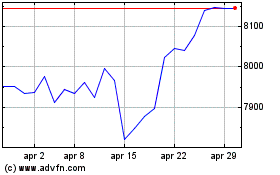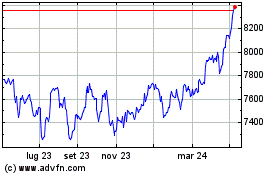U.S. Stocks Slip After Retail Sales Unexpectedly Fall
16 Ottobre 2019 - 4:04PM
Dow Jones News
By Will Horner
U.S. stocks fell Wednesday after economic data suggested
consumers were holding back on spending in the face of trade
tensions and a global economic slowdown.
The Dow Jones Industrial Average fell 67 points, or 0.2%, to
26959 shortly after the opening bell. The S&P 500 dropped 0.2%
and the Nasdaq Composite declined 0.4%.
Data from the Commerce Department Wednesday showed that U.S.
retail sales slipped by 0.3% in September. Economists polled by The
Wall Street Journal had been anticipating the data to show a 0.2%
rise in sales.
The focus Wednesday will be on the second day of corporate
earnings season with a swath of earnings reports from some of the
U.S.'s biggest bellwethers.
Before U.S. markets opened, PNC Financial Services Group
reported a rise in third-quarter revenue that beat analysts'
forecasts. Its share rose 0.4%. Bank of New York Mellon shares rose
1.2% and Bank of America shares were up 2.5% after they too
released third-quarter earnings.
IBM and Netflix will also report their third-quarter earnings
after markets close in the U.S
Global stocks, meanwhile, wavered as concerns lingered over
Brexit talks and the prospect of a U.S.-China trade deal.
The pan-continental Stoxx Europe 600 index edged 0.1% lower as
talks toward a draft plan for Britain to leave the European Union
continued. Investors had been anticipating positive news to emerge
overnight but were disappointed by a lack of progress Wednesday,
said Peter Dixon, a senior economist at Commerzbank.
"We were told there would be a deadline of midnight last night,
both sides sounded very positive. Then we woke up and it was still
a work in progress and I think that has changed investors'
perceptions of where we are," he said.
Even if a deal is reached, questions remained about whether the
British Parliament will back it, others cautioned.
"It does look like there is progress but there are hurdles to
get something agreed with the EU and then it will be difficult to
get it through Parliament," said Christopher Peel, chief investment
officer at Tavistock Investments.
The British pound, which had hit a four-month high against the
U.S. dollar a day earlier, was flat while the FTSE 100 gauge for
U.K. equities slipped 0.3% and the broader FTSE 250 fell 0.3%.
Chinese stocks edged lower on concerns that tensions with the
U.S. over the Hong Kong protests would make striking a trade deal
more complicated.
The Shanghai Composite Index fell 0.4% after the U.S. House of
Representatives passed a series of bills backing pro-democracy
protesters in Hong Kong, drawing a strong rebuke from China. A
Chinese Foreign Ministry spokesman warned the U.S. against meddling
in Chinese affairs and said the bill would damage relations between
the two nations.
The development may complicate efforts to reach a trade
agreement, analysts said.
"We got sideswiped by those headlines from China," said Stephen
Innes, a market strategist for currency broker AxiTrader in
Bangkok. "I'm not sure much is going to actually come from it, but
it's just another thing to deal with."
(END) Dow Jones Newswires
October 16, 2019 09:49 ET (13:49 GMT)
Copyright (c) 2019 Dow Jones & Company, Inc.
Grafico Indice FTSE 100
Da Mar 2024 a Apr 2024

Grafico Indice FTSE 100
Da Apr 2023 a Apr 2024
